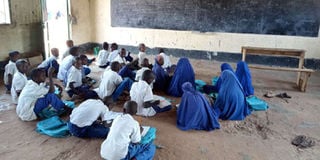Northern region stares at education crisis as teachers flee

Class in session at a school in Wajir County. Families face an educational crisis as teachers flee terror hotspots in the norther region. PHOTO | BRUHAN MAKONG | NATION MEDIA GROUP
What you need to know:
- The situation mirrors the 2018 mass exodus that saw hundreds of teachers leave Wajir County.
- The Al-Qaeda linked group has stepped up attacks in counties bordering Somalia since December.
- Knut has threatened to mobilise tutors to leave insecure schools and regions even as security agencies give reassurances.
The Northern Kenya region is on the cusp of yet another education crisis as teachers begin fleeing amid fears of increasing Al-Shabaab attacks.
This is despite assurances by government agencies that they have enhanced security in areas considered to be terror hotspots.
The Al-Qaeda linked group has stepped up attacks in counties bordering Somalia since December.
In the last five weeks alone, the Somalia-based ragtag militia has carried out more than 10 attacks in both the Northern and Coastal regions that have left at least 25 people dead.
The situation mirrors the 2018 mass exodus that saw hundreds of teachers leave Wajir County following an attack on Qarsa Primary School when insurgents killed three people including two teachers.
A section of teachers from Garissa and Mandera were also transferred. At least 250 schools were forced to close due to lack of teachers while those that remained open were run by headteachers and a few tutors.
In a region that mostly depends on teachers from other parts of the country, another exit could spell doom for families with school-going children who are now staring at a bleak future.
Hussein Ali, a resident of Wajir who is also a parent to six school-going children, told the Nation that another transfer of teachers from the region will be catastrophic.
“I am really worried about my children’s future. It will really be bad for us parents if our teachers leave again,'' he said.
A similar scene was also witnessed in 2014 when Shabaab militants ambushed a Nairobi-bound bus in Mandera, killing 28 passengers. Most of the victims were teachers.
Since then, while significant progress has been made, counties in the North still lag behind others in terms of education. This has been widely blamed on lack of adequate teachers, harsh climatic conditions and terrorism.
URGENT ACTION NEEDED
On Monday, Kenya National Union of Teachers (Knut) Secretary-General Wilson Sossion called on Education Cabinet Secretary George Magoha to convene an urgent meeting to discuss the security of teachers.
The union has threatened to mobilise tutors to leave insecure schools and regions even as security agencies give reassurances.
“The Ministry must discuss the security of teachers and students in our institutions and assure Kenyans that schools are safe for learning ... We have in the past been assured of protection and action but the killings have continued,” Mr Sossion said in a press briefing yesterday.
Garissa County regional education officer Yusuf Karayu told the Nation that they were consulting with the Teachers Service Commission (TSC) on the way forward following the attack.
"I am told some schools have closed, others are planning to close. But let me assure the residents and Kenyans that the government has put good plans in place to make sure we deal with this problem," he said.
The State employer assured teachers across the country that it was working closely with security agencies to ensure their safety.
LIVING IN FEAR
Teachers from neighbouring Mandera County now say they are living in fear after three of their Garissa counterparts were murdered in a pre-dawn attack.
The attack, which happened around 2.30 am, has left teachers operating in the region in panic as they expressed fear for their lives.
The militants are said to have spared female teachers and a nurse during the attack.
Several teachers who survived the attack narrated how they narrowly escaped death at the hands of the militants.
Robert Kivuti, a teacher, said that he ran for his dear life towards the bush after hearing gunshots. He was pursued by two militants for close to 100 metres before they left him alone.
Another survivor, Ann Gideon, said she heard one of the attackers speaking Swahili and telling his counterparts to ensure that no one is left alive, before proceeding to the men's house where they executed them.
Lucy Wanjiru, another teacher, had a young child at the time of the attack. She had to hide under a bed, she said.
Just a week ago, four pupils lost their lives when the militants staged a dawn attack at Saretho Primary School in Dadaab Sub-County.
The attack also left three pupils and an officer injured.




